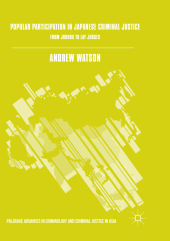 Neuerscheinungen 2018Stand: 2020-02-01 |
Schnellsuche
ISBN/Stichwort/Autor
|
Herderstraße 10
10625 Berlin
Tel.: 030 315 714 16
Fax 030 315 714 14
info@buchspektrum.de |

Andrew Watson
Popular Participation in Japanese Criminal Justice
From Jurors to Lay Judges
Softcover reprint of the original 1st ed. 2016. 2018. xi, 177 S. 210 mm
Verlag/Jahr: SPRINGER, BERLIN; SPRINGER INTERNATIONAL PUBLISHING 2018
ISBN: 3-319-81717-5 (3319817175)
Neue ISBN: 978-3-319-81717-0 (9783319817170)
Preis und Lieferzeit: Bitte klicken
This book analyses the mixed courts of professional and lay judges in the Japanese criminal justice system. It takes a particular focus on the highly public start of the mixed court, the saiban-in s ystem, and the jury system between 1928-1943. This was the first time Japanese citizens participated as decision makers in criminal law. The book assesses reasons for the jury system´s failure, and its suspension in 1943, as well as the renewed interest in popular involvement in criminal justice at the end of the twentieth century.
Popular Participation in Japanese Criminal Justice proceeds by explaining the process by which lay participation in criminal trials left the periphery to become an important national matter at the turn of the century. It shows that rather than an Anglo-American jury model, outline recommendations made by the Japanese Judicial Reform Council were for a mixed court of judges and laypersons to try serious cases. Concerns about the lay judge/ saiban-in system are raised, as well as explanations for why it is flourishing in contemporary society despite the failure of the jury system during the period 1928-1943. The book presents the wider significance of Japanese mixed courts in Asia and beyond, and in doing so will be of great interests to scholars of socio-legal studies, criminology and criminal justice.
Introduction.- Chapter 1. A New Chapter in Japanese Social and Legal History.- Chapter 2. An Earlier Experience of Lay Involvement in Court Decisions in Japan: The Jury 1928-1943.- Chapter 3. Disquiet About Japanese Criminal Justice and a Revival of Interest in Juries.- Chapter 4. The Debate About Juries.- Chapter 5. The Judicial Reform Council and Its Recommendations.- Chapter 6. The Saiban-in Law and Intense Preparation for its Operation.- Chapter 7. Launch and Then Solid Progress.- Chapter 8. Concerns and Challenges.- Chapter 9. Opinions on the Lay Judge System.- Chapter 10. Successes of Lay Judges and Failures of 1928-1943 Juries.- Conclusion.
Andrew Watson is Senior Lecturer in Law at Sheffield Hallam University, UK. He has previously worked at Niigata University, Japan, and the College of Law, London, UK.


